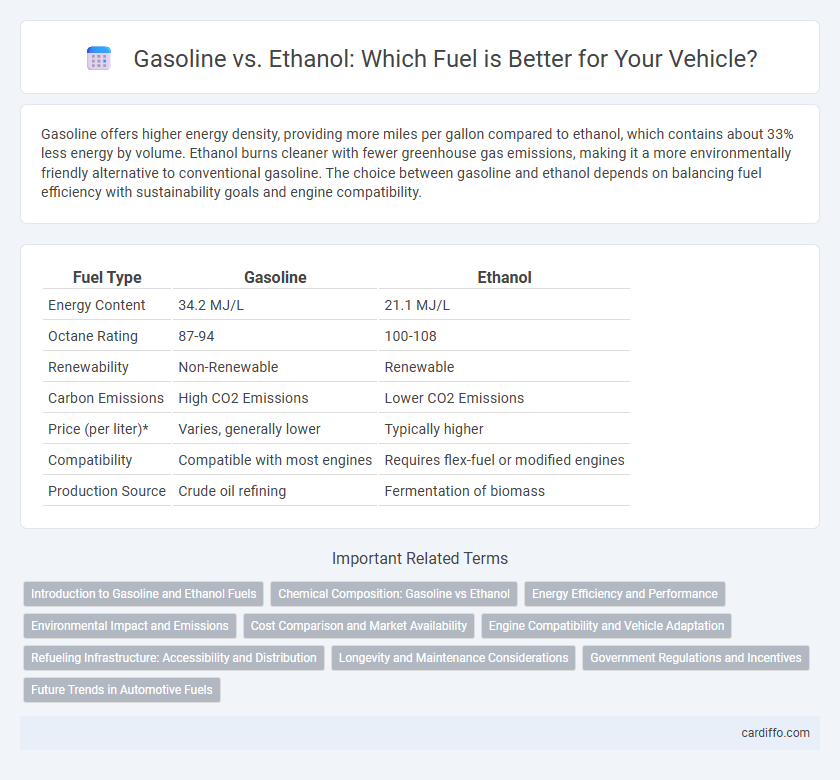Gasoline offers higher energy density, providing more miles per gallon compared to ethanol, which contains about 33% less energy by volume. Ethanol burns cleaner with fewer greenhouse gas emissions, making it a more environmentally friendly alternative to conventional gasoline. The choice between gasoline and ethanol depends on balancing fuel efficiency with sustainability goals and engine compatibility.
Table of Comparison
| Fuel Type | Gasoline | Ethanol |
|---|---|---|
| Energy Content | 34.2 MJ/L | 21.1 MJ/L |
| Octane Rating | 87-94 | 100-108 |
| Renewability | Non-Renewable | Renewable |
| Carbon Emissions | High CO2 Emissions | Lower CO2 Emissions |
| Price (per liter)* | Varies, generally lower | Typically higher |
| Compatibility | Compatible with most engines | Requires flex-fuel or modified engines |
| Production Source | Crude oil refining | Fermentation of biomass |
Introduction to Gasoline and Ethanol Fuels
Gasoline is a hydrocarbon-based fuel derived primarily from crude oil, widely used in internal combustion engines due to its high energy density and easy ignition properties. Ethanol is an alcohol-based biofuel typically produced from fermenting biomass such as corn or sugarcane, offering a renewable alternative with lower carbon emissions. Both fuels play significant roles in transportation energy, with gasoline providing established infrastructure compatibility and ethanol contributing to sustainability and reduced fossil fuel dependence.
Chemical Composition: Gasoline vs Ethanol
Gasoline primarily consists of hydrocarbons such as octane (C8H18), a complex mixture derived from petroleum refining, containing carbon and hydrogen atoms in various chain and ring structures. Ethanol (C2H5OH), a biofuel, has a simpler chemical composition characterized by two carbon atoms, six hydrogen atoms, and one hydroxyl group, making it an oxygenated molecule. The presence of oxygen in ethanol enhances its combustion efficiency and reduces emissions compared to the purely hydrocarbon-based gasoline.
Energy Efficiency and Performance
Gasoline offers higher energy density, providing greater fuel efficiency and longer driving range compared to ethanol, which contains about 34% less energy per gallon. Ethanol delivers a higher octane rating, improving engine performance and reducing knocking, but its lower energy content leads to increased fuel consumption. Choosing between gasoline and ethanol involves balancing energy efficiency with engine power and emissions considerations.
Environmental Impact and Emissions
Gasoline combustion releases high levels of carbon dioxide, nitrogen oxides, and particulate matter, contributing significantly to air pollution and greenhouse gas emissions. Ethanol, derived from biomass, produces fewer greenhouse gases and burns cleaner, emitting less carbon monoxide and particulate matter, though its cultivation can impact land use and water resources. Lifecycle analysis shows ethanol's potential to reduce net carbon emissions by up to 40% compared to conventional gasoline.
Cost Comparison and Market Availability
Gasoline typically costs less per gallon than ethanol but is more susceptible to price fluctuations due to crude oil dependency. Ethanol, often derived from corn or sugarcane, has a higher price per unit of energy yet benefits from government subsidies and renewable fuel standards that improve affordability. Market availability favors gasoline with widespread distribution infrastructure, while ethanol is commonly blended in fuels like E10 and E85, limiting its standalone presence but increasing overall renewable fuel market share.
Engine Compatibility and Vehicle Adaptation
Gasoline engines are widely compatible with existing vehicles, offering stable performance and fuel efficiency without requiring significant modifications. Ethanol, especially in high concentrations like E85, often necessitates engine adjustments or flexible-fuel vehicle (FFV) technology to prevent corrosion and ensure proper combustion. Vehicle adaptation for ethanol includes hardened fuel system components and reprogrammed engine control units (ECUs) to optimize air-fuel mixture and ignition timing.
Refueling Infrastructure: Accessibility and Distribution
Gasoline refueling infrastructure is extensive with millions of stations worldwide, ensuring high accessibility and convenient distribution. Ethanol, primarily in blends like E10 and E85, faces limited availability due to fewer dedicated pumps and regional restrictions. Expanding ethanol distribution networks requires investment in compatible fueling equipment and regulatory support to improve accessibility.
Longevity and Maintenance Considerations
Gasoline engines typically offer longer intervals between maintenance due to stable combustion properties, while ethanol's higher corrosiveness can accelerate wear on fuel system components such as seals and pumps. Ethanol fuels absorb more moisture, potentially leading to corrosion and fuel degradation, which requires more frequent filter changes and fuel system inspections. Choosing gasoline may reduce long-term maintenance costs and improve engine longevity, whereas ethanol blends demand vigilant upkeep to prevent damage and maintain optimal performance.
Government Regulations and Incentives
Government regulations favor ethanol by enforcing renewable fuel standards that mandate blending ethanol with gasoline, reducing reliance on fossil fuels. Incentives such as tax credits and subsidies encourage ethanol production and consumption, promoting cleaner energy alternatives. Gasoline faces stricter emission standards and fewer financial benefits, making ethanol a more attractive option under current policies.
Future Trends in Automotive Fuels
Ethanol is gaining traction as a renewable alternative to gasoline, driven by stricter emissions regulations and advancements in biofuel technology. Electric vehicles and hybrid models increasingly incorporate ethanol blends, reducing carbon footprints and reliance on fossil fuels. Government incentives and global shifts towards sustainability are accelerating the adoption of ethanol, shaping the future landscape of automotive fuels.
Gasoline vs Ethanol Infographic

 cardiffo.com
cardiffo.com